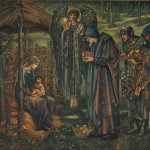We run our website the way we wished the whole internet worked: we provide high quality original content with no ads. We are funded solely by your direct support. Please consider supporting this project.

When the Last Few Moments Changes Everything
One of the central things ReKnew wants to accomplish is to challenge followers of Jesus to accept that the self-sacrificial love Jesus revealed on the cross is the definitive, and even the exhaustive, revelation of God’s character. Everything about God, we believe, should be understood through the lens of the cross.
For most Christians, Jesus is part of their mental image of God, but not all of it. They rather have an amalgamated mental portrait of God in which the revelation of God in Christ is fused with a variety of violent and/or nationalistic portraits in the Old Testament. As I noted in my previous post on this topic, the reason for this is that Christians are typically taught that if the whole Bible is the inspired Word of God (which I agree with), then everything in it, including its various portraits of God, must be equally authoritative (which I disagree with).
The assumption that everything in Scripture is equally authoritative inclines Christians, especially Christians from more conservative churches, to read it along the lines of a cookbook. Like a recipe, the meaning and authority of a passage isn’t much affected by where it’s located within the overall book. The truth, however, is that the Bible is not at all like a cookbook. It’s a story, along the lines of a novel. And it’s a story with a very surprising twist in it.
Have you seen “The Sixth Sense,” staring Bruce Willis, or “The Book of Eli,” starring Denzel Washington? Spoiler Alert! I won’t give away the ending, but I’ll just say that the last minutes of both shows completely reframe the movie. You have to rethink every single thing that took place in light of last few moments of the movie. This is quite a bit like the kind of story the Bible tells.
The whole Old Testament leads up to, and is fulfilled in, Jesus the Messiah. But the particular way Jesus fulfills it reframes everything. Hardly anyone saw this coming! In fact, the way Jesus completes the story of God’s dealings with Israel was so unexpected, most who were looking for the Messiah couldn’t accept him once he came.
For example, most Jews were looking for a Messiah who would reinforce Israel’s status as God’s favored nation by leading a revolt against its oppressors (the Romans) and reinstating it as a sovereign nation. Jesus instead turned Jewish religious nationalism on its head by proclaiming a kingdom in which many “outsiders” (Gentiles and sinners) would become “insiders” while many who assumed they were “insiders” would find themselves on the outside. And far from leading a revolt, Jesus commanded people to love their enemies (e.g. the Romans) and to therefore refrain from all violence, choosing instead to do good to their enemies, bless their enemies, serve their enemies, and to turn the other cheek when struck.
In fact, not only does Jesus not lead people in a military conquest over their enemies, he allows himself to be executed on a cross to reveal God’s profound love for enemies! And in this scandalous and unexpected action, his followers discerned the ultimate revelation of God’s true nature. With his life, ministry, teaching, and especially his sacrificial death, Jesus provided a picture of God and his kingdom that forces us to reframe everything that led up to him.
Over the next several posts I will argue that this means that we shouldn’t place the revelation of God in Jesus alongside of the portraits of God in the Old Testament. Rather, we’ll only begin to see how Jesus reframes the storyline of God’s dealings with Israel if we place his revelation over all previous revelations and if we then interpret all previous revelations through the lens of this one. In fact, we’re going to see that this is precisely what Jesus and the authors of the New Testament instruct us to do. As much as they affirm the inspiration of the Old Testament, they are even more emphatic in proclaiming that the revelation of God in Christ completes, and in this sense trumps, everything that preceded him.
Image by seier+seier. Sourced via Flickr.
Category: General
Tags: Bible, Cruciform Theology, Jesus, Picture of God, ReKnew
Related Reading

Getting Honest about the Dark Side of the Bible
Eddy Van 3000 via Compfight While most of the Bible exhibits a “God-breathed” quality, reflecting a magnificently beautiful God that is consistent with God’s definitive revelation on the cross, we must honestly acknowledge that some depictions of God in Scripture are simply horrific. They are included in what is sometimes called “the dark side of…

Christmas is Subversive…
…at least the first Christmas was. When Jesus came it was about the birth of a subversive ruler who brought a subversive kingdom. He is a king that came to introduce a reign that would overthrow the world. Click here for a brief reflection by Greg on Subversive Christmas, brought to you by Nomad.

Was Jesus Violent in the Temple?
Many adopt the attitude depicted in the picture above, saying that Jesus used violence when he cleansed the temple. But Jesus’ stance on nonviolence is clear not only from how he responded to threatening enemies at the end of his life; it’s also strongly emphasized his teachings. We need to understand what Jesus was up…

Old and New
Old & New – Round 3 Trailer by Fred Sprinkle. Our good friend Jim LePage is a graphic artist with amazing talent. Some of you are familiar with him via his work for Woodland Hills or through his amazing Word designs in which he came up with a graphic piece for each book of the Bible.…

Should Innovative Theology Be Rejected?
In some conservative Christian circles innovation is suspect, if not sin. And as a result, theologians and pastors who take this stance often criticize what I propose in my writings simply because it’s innovative. However, I would like to suggest that the attitude that would dismiss hermeneutical or theological proposals simply on the grounds that…

Scripture’s God-Breathed Imperfections
“Inerrancy” of Scripture
As a conservative evangelical who accepted the “inerrancy” of Scripture, I used to be profoundly disturbed whenever I confronted contradictions in Scripture, or read books that made strong cases that certain aspects of the biblical narrative conflict with archeological findings.
